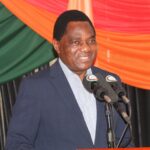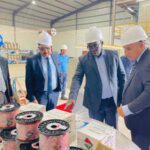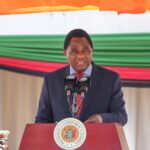In a bold step to reinforce Zambia’s grassroots healthcare delivery, President Hakainde Hichilema has donated 595 blood pressure monitoring machines and 595 glucose testing devices to support the Southern Province’s Health Learners Programme. This strategic move aims to enhance the capacity of school-based health programmes to provide early diagnosis and preventative care for non-communicable diseases such as hypertension and diabetes.
The symbolic handover took place during the graduation ceremony of more than 500 health learner professionals, marking a significant milestone in the country’s efforts to integrate health services into the education sector. Representing the President at the event, Alfred Sakwiya, Director for Enhanced Public Services under the Presidential Delivery Unit (PDU), highlighted the administration’s vision to empower young health leaders with practical tools and training.
Empowering the Next Generation of Health Champions
“On behalf of the President, I extend heartfelt appreciation for your service,” said Sakwiya during the handover. “This donation of 595 BP and 595 glucose testing machines demonstrates his deep commitment to ensuring that learners are not just educated but equipped with the means to serve.”
The new equipment is expected to significantly improve the diagnostic capabilities of schools and community health centres by enabling real-time detection of health issues. With the rise of lifestyle diseases among Zambia’s population, particularly in rural areas, this initiative is seen as a vital component in boosting community health resilience.
A Forward-Looking Investment in Preventative Healthcare
Southern Province Minister Credo Nanjuwa, in remarks delivered by Deputy Permanent Secretary Yolanta Malunga, lauded the donation as a strategic investment in the province’s health and education infrastructure.
“This is more than a donation; it is an investment in our future health leaders and in the wellbeing of our schools and communities,” Nanjuwa noted. “By equipping our health learners with practical diagnostic tools, we are not only improving health service delivery but also reinforcing the importance of early intervention.”
The Southern Province now joins a growing list of regions benefiting from the government’s push to combine education with health service delivery, under the banner of the Health Learners Programme. This initiative continues to play a critical role in promoting health literacy, peer support systems, and access to essential healthcare services in schools.
Scaling the Impact of the Health Learners Programme
Originally designed to increase health awareness among learners and train school staff in basic healthcare, the Health Learners Programme has evolved into a cornerstone of Zambia’s preventative healthcare strategy. With the introduction of BP monitors and glucose meters into the programme, the government is not only enhancing the quality of care in schools but also laying the groundwork for a healthier future generation.
The integration of diagnostics into school health services will enable earlier intervention for chronic conditions that often go undetected until they become severe. This aligns with the government’s broader health goals, including reducing the burden of non-communicable diseases and achieving universal access to health services by 2030.
A Model for Community-Based Health Innovation
The Southern Province’s success with the Health Learners Programme is rapidly becoming a model for community-based health innovation in Zambia. With this latest support from the Presidency, the region is expected to further solidify its position as a leader in school-based healthcare delivery.
As President Hichilema continues to champion initiatives that bring health services closer to the people, this donation underscores his administration’s resolve to invest in both people and infrastructure. The partnership between the Presidential Delivery Unit, provincial leadership, and community health stakeholders remains central to the ongoing transformation of Zambia’s public health landscape.
With strong leadership, strategic investments, and a focus on youth empowerment, Zambia is well on its way to building a healthier, more resilient future—starting in the classroom.






